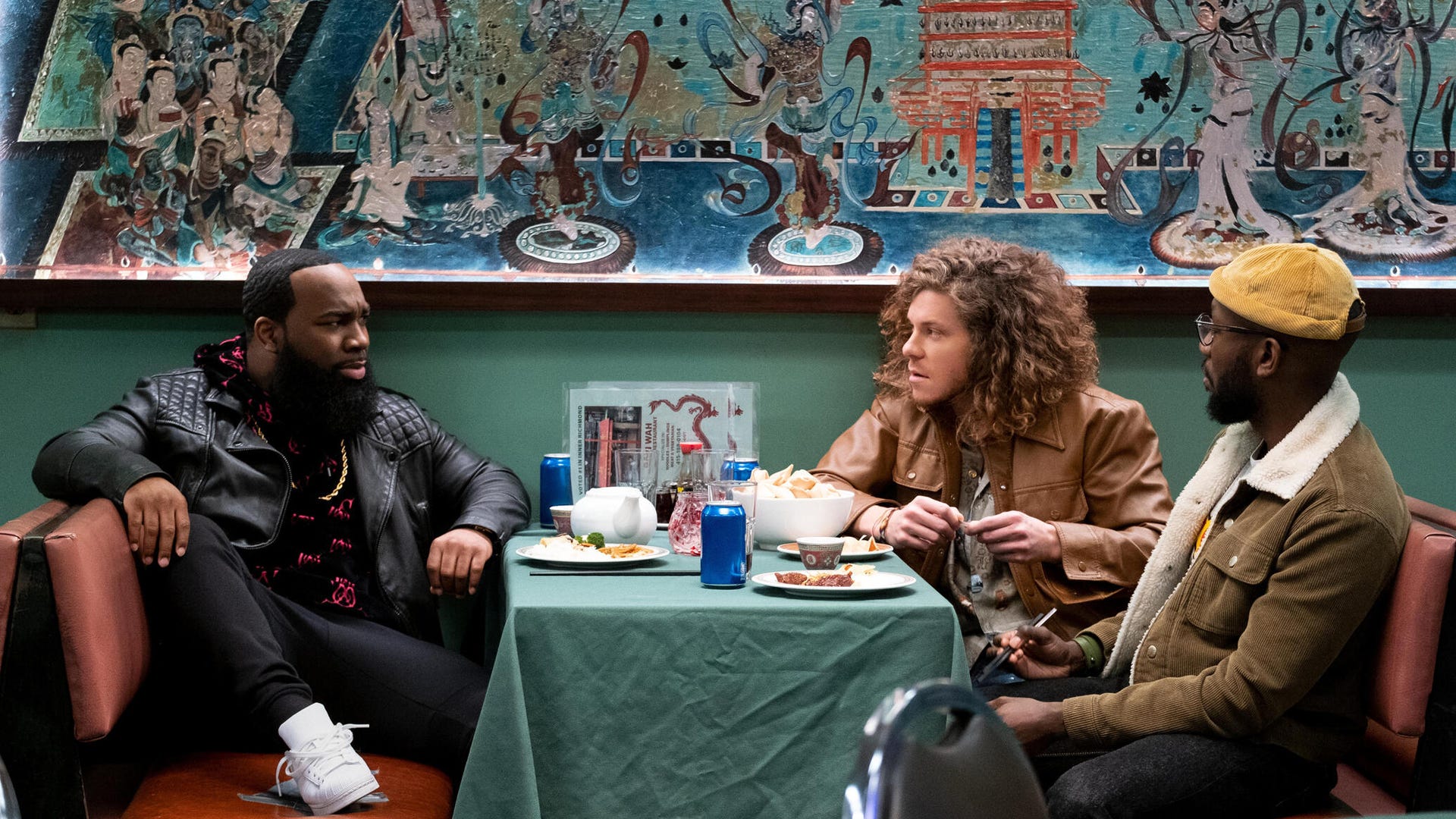Join or Sign In
Sign in to customize your TV listings
By joining TV Guide, you agree to our Terms of Use and acknowledge the data practices in our Privacy Policy.
Woke Review: Hulu Comedy Deftly Tackles Racial Issues After a Sleepy Start
The road to "wokeness" is paved in humor
Enlightenment is a process. No one is born with the ability to identify and fight against racism, sexism, classism, homophobia, and other forms of discrimination. Life experiences and other people help us figure out right from wrong and how we choose or don't choose to adjust and react.
On the new Hulu comedy Woke, which premieres Sept. 9, the road to "wokeness" for an ambitious cartoonist named Keef (Lamorne Morris) is paved in grimly humorous ways. That's because Keef goes out of his way to avoid addressing his race until a brutal interaction with a San Francisco police officer forces him to confront what it means to be a Black man in America. Following the altercation, Keef not only challenges the absurd and random cruelties of racism, he starts to hear and see the inanimate objects around him come to life to point out his shortcomings and those of society.
The Best TV Shows and Movies to Watch on Hulu in September
For instance, Cedric the Entertainer voices an astute garbage can angered by a cluster of white hipsters who buy a previously Black-owned barbershop and commit painfully comedic acts of cultural appropriation. There's also a permanent marker (JB Smoove) that attempts to convince Keef to draw more racially conscious comic strips; a brown paper bag (Cree Summer) that knows Keef can't pronounce Ta-Nehisi Coates' first name; and a couple of 40 ounce beers (Nicole Byer and Eddie Griffin) that lampoon malt liquor marketing campaigns.
The humans in Keef's life also have no shortage of opinions. The most vocal are his friends and roommates Clovis (T. Murph) and Gunther (Blake Anderson), who constantly offer up unsolicited and contradictory pieces of advice. Clovis, for instance, wants Keef to walk off his newly found woke ways because "woke rhymes with broke." Gunther, on the other hand, encourages Keef to embrace his heightened awareness and use it to his advantage. Keef's alternative newspaper editor Ayana (Sasheer Zamata) challenges him professionally and helps him to take ownership of his artistic expression.

T. Murph, Blake Anderson, and Lamorne Morris, Woke
Liane Hentscher/HuluAll three characters evolve by the sixth episode -- easily one of the show's best -- when Woke truly finds its creative footing and gives this trio of supporting characters discernible depth and humanity. This is especially true for Anderson, who shines as Gunther and pivots out of caricature as the token woke, weed-smoking, white friend. Questioning the privilege of his whiteness and even his male heterosexuality, Gunther's quest adds much-needed subtlety.
Most of the show's weight, however, rests squarely on Morris' shoulders as the comedy's leading man who appears in nearly every scene. It's a weight Morris clumsily embraces until Woke's later episodes, when Keef's voice and motivation -- as well as that of Morris -- become strong and unwavering. Up until that point, a lot of Morris' performance feels like an all-too-familiar extension of his New Girlcharacter Winston with costars and even talking objects eclipsing him at every turn. But somewhere around Episode 5, it's like a switch gets flipped on and suddenly it's easy to tell the difference between Keef and Winston, Morris' most notable roles to date, and the show is all the better for it.
The Best New Shows to Binge-Watch This Fall
Like its star, Woke struggles at times to distinguish itself beyond the device of talking devices. Vacillating motivations has Woke both mocking and embracing the concept of wokeness, while itself failing to pass the Bechdel test. Instead, the writers and producers satirize everything from cancel culture to racial fetishism, animal rights, and sneakerheads.
In classic sitcom fashion, financial woes are referenced but neither fully addressed nor notably resolved, and Keef's love interests, Katrina (Alvina August) and Adrienne (Rose McIver), never get as close to Keef as his boys. Although Adrienne and Keef talk about their interracial relationship and how it impacts his identity, the couple's courtship in comparison to the way he treats Katrina will definitely make tongues wag on Black Twitter.
What Woke gets right is the way it deftly addresses racial profiling, excessive police force, and the PTSD Keef suffers soon thereafter, which is based on a real-life experience cartoonist and series co-creator Keith Knight had. Realistic and relatable, the pain Keef tries to downplay naturally comes to a head and sets up a brilliantly executed Season 1 finale. Although the comedic series wrapped before George Floyd's murder and the racial reckoning that followed, the premise is tragically timeless.
Keef's inner struggles as a Black artist versus an artist who happens to be Black is an unapologetically funny and honest through line that also gives the show the authenticity it needs. Although San Francisco as a setting doesn't factor in as the uncredited character that it should, Stanley Clarke's thoughtful score deliciously folds in a number of Black musical influences and vibes.
After all, Woke is a vibe worth experiencing. The trick is sticking around long enough for its version of enlightenment to pay off.
TV Guide rating: 4/5
All eight episodes of Woke premiere Wednesday, Sept. 9 on Hulu.

Lamorne Morris, Woke
Liane Hentscher/Hulu